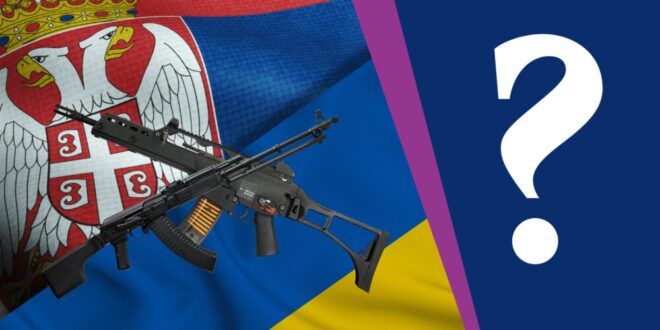Photographs of Krušík’s unexploded mines, published by Russian soldiers, echoed in Serbia once again calling into question the declarative decision of the local authorities to stay away from the war in Ukraine.
Information that mines from Valjevo were sold to Ukraine was denied by the Serbian Ministry of Trade, which is authorized by law to grant licenses for the export of weapons.
“The inspection of the database, as well as the data available to us, established the following – in the period from 2014 to 2021, there were no exports of NGOs to Ukraine,” the Ministry of Trade stated in response to Radio Free Europe’s questions. The ministry added that in the same period no weapons were exported from Serbia to any other country, where the end user would be Ukraine.
However, despite the official denial, the question remains open – should Serbia export weapons to Ukraine?
Although numerous public opinion surveys suggest that the majority of Serbian citizens would be against such a step, the interlocutors contacted by Danas have a different opinion.
Zoran Dragišić, professor of the Faculty of Security and member of parliament on the list of the Serbian Progressive Party, points out that Ukraine is not under United Nations sanctions, and that in that sense there is no legal obstacle for Serbia to sell weapons to this country.
- My position is that, not only should he sell, but he should also donate some of the weapons to Ukraine. Such a move would certainly have political repercussions in the sense that Serbia’s reputation would grow significantly in the world, says Dragišić.
Lawyer Čedomir Stojković has a very similar, almost identical opinion. In recent months, he came into the public’s focus as the president of the “Oktobar” group, which sees the “covert hybrid occupation of Serbia carried out by Vladimir Putin’s regime” as the main challenge of the times we live in.
- Serbia should not sell, but give weapons to Ukraine. This is the only way he can wash off the shame of the fact that he has avoided imposing sanctions on Russia for a year. In particular, we should present Russian tanks and MIGs, which we also received from Russia at one time. In this way, we would finally find ourselves in the European family of nations, concludes Stojković.
If the whole matter is looked at from an economic point of view, a similar conclusion is reached. Professor of the Faculty of Economics in Belgrade Ljubodrag Savić points out that weapons are commodities like any other, and that it is logical that they should be exported in order to make money.
- For example, if Serbia does not export weapons to Ukraine because there is a war there, it does not mean that some other country will not do it. Also, even if Serbia does not directly deliver weapons to Kiev, it does not mean that they will not reach Ukraine through an intermediary to whom our country sold them. And along these lines, someone can again ask a moralistic question why Serbian weapons were found on the Ukrainian battlefield. This matter must be viewed only from a business angle and perhaps the best option is to sell weapons to middlemen. Nobody is happy that weapons are used in wars to kill people, but that doesn’t change the fact that they are commodities. Also, many sell weapons to Ukraine, and only in the case of Serbia is the question whether it is right to do so or not, says Savić.
Economist Milan R. Kovačević notes that, if Serbia’s strategy is the development of dedicated industries, then that product should also be exported. Otherwise, Kovačević adds, such a strategy makes no sense.
- Truth be told, dedicated industry in our country suffers losses, so the question is whether it should exist at all. In the specific case, Serbia should not directly export weapons to a country like Ukraine where the war is going on. Our country should sell weapons to intermediaries in that trade. The fact that the weapon was sold to a dealer does not automatically mean that he will not resell it, that is, that it will not be used on the battlefield where it can end up precisely because the intermediary would send it to Ukraine after purchasing it from our country, Kovačević points out.
 Eurasia Press & News
Eurasia Press & News




